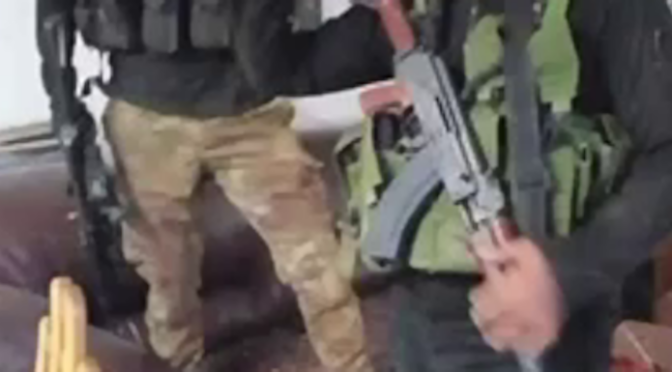


Remain steadfast Washington: Don’t restrain Israel as it crushes Hamas
Article published by Ynetnews.com, 13 October 2023. © Richard Kemp
Sderot Mayor Alon Davidi showed me the rubble of his city’s police station, where just a few days ago 25 police officers were brutally murdered. He reckoned around 200 of his citizens had been butchered by Hamas terrorists as they rampaged through the streets last weekend, gunning down men, women, children and babies. The grizzly remnants of this 21st-century pogrom were all over Sderot, including crashed and bullet-riddled cars with smashed windows and blood smears inside and out.
Next to the police station a couple of bloated terrorist corpses lay with cloths thrown over their faces. Someone had clearly offered respect to the dead, but I found it hard to feel anything but contempt even for the cadavers of savages who had wrought such hell on the innocent people of a city I have visited many times in the past. Today, Sderot is not much more than a ghost town: most of its surviving citizens have sought safe haven elsewhere.
The mayor asked me to relay a message to the British people, and by extension, everyone in the civilized world: ‘Let the IDF get on with it; don’t attempt to pressure us into stopping before the terrorists are attacked so hard they can’t raise a finger against us ever again.’
After another rocket slammed into a Sderot house, wounding a resident and sending a pillar of black smoke into the sky, I moved closer to the Gaza border and spent time in a field base, chatting to young infantrymen of the Givati Brigade, some of whom were at pains to point out that theirs is the best unit in the whole of the IDF.
I’ve spent most of my life with soldiers like that, fiercely proud of their own regiment, joshing each other and joking around, even on the eve of what they expect to be a violent assault into enemy territory. Knowing the perils they face when they are sent into a world of lethal booby traps, hidden bombs, landmines, snipers, ambushes, Continue reading
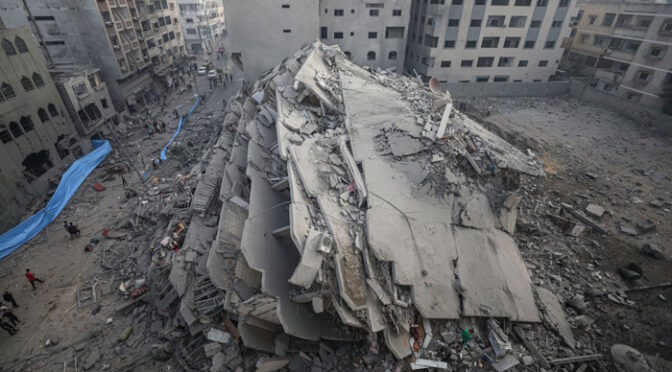
Dispatch from the Gaza border
Article published in The Daily Express, 13 October 2023. © Richard Kemp
Speaking from the border yesterday IDF Chief of Staff Herzi Halevi made clear that armed terrorist gangs would be totally removed from the Gaza Strip. That is the objective of Israel’s Operation Iron Swords, launched in response to the mass slaughter, rape and abduction of Israeli civilians and soldiers last weekend by Hamas terrorists.
Over the last few days the crash of explosions has been almost incessant and I have watched pillars of smoke rising up from Gaza as Israel launched strike after strike against terrorist targets, using combat planes, guided missiles and artillery. These attacks are not going to end any time soon as Israel progressively works its way through pre-prepared target lists that include terrorist leaders, command posts, communications infrastructure, arms dumps and rocket launchers.
Israel has mobilised more than 300,000 soldiers for this fight and there is every likelihood that in the coming days Halevi will send troops and tanks in on the ground as well to complete the process of eliminating Hamas as a viable terrorist entity. I have spoken to IDF soldiers deployed around Gaza, preparing and training for exactly that.
They will face immense dangers as they advance across ground that Hamas has prepared with remote controlled explosives, ambushes and anti-armour teams. There is an underground city beneath Gaza to enable Hamas fighters to take IDF soldiers by surprise and outflank attacking formations. The IDF has trained for exactly this form of combat and will prevail on the ground, although they could well take heavy casualties. Towns and cities are the most dangerous places and it is likely that where possible IDF troops will remain in open areas from where they can control the main above-ground routes through the Strip. Continue reading
Israel’s only option is overwhelming force
Article published in The Daily Telegraph, 10 October 2023. © Richard Kemp
Israel must use whatever force it can bear to strangle the terrorist groups who massacred, brutalised and kidnapped its citizens and are willing to do the same again. That may sound like callous warmongering, but it is not. When a country faces a vicious enemy that is intent on the murder of its people, a responsible government has no choice other than to stop it in any way it can. And please don’t say that, in Israel’s case, it can only be resolved with a political solution – because there won’t be one in the foreseeable future.
Hamas doesn’t want peace and prosperity for its people. It doesn’t want a two-state solution. What it does want is the annihilation of the Jewish state from the Jordan River to the Mediterranean Sea – in other words, all of it. Read its founding document, where this is spelt out in black and white; the events of the last few days show conclusively that the Hamas charter isn’t just hyperbole.
Like Islamic State, which the group resembles in both method and ideology, Hamas is not susceptible to any form of political bargaining, compromise or negotiation. That much has been proved time and again in previous rounds of violence, when it was handed political concessions only to unleash terror again once it had rebuilt its military capabilities.
Thus Hamas can only be stopped by being defeated. That means crushing its will to resist, something which is only attainable by eliminating fighters in large numbers and destroying combat capability through devastating military force. If Israel fails to do that, it can only result in interminable conflict in which many more people on both sides will die.
The consequences of such an outcome go well beyond this immediate conflict. We saw how the West’s humiliating withdrawal from Afghanistan in 2021 emboldened Vladimir Putin to launch an invasion in Ukraine six months later. Now we risk emboldening terrible actors in the Middle East, who seek not just to strike but permanently destroy our allies.
The US and the rest of Nato wield the greatest military capability in the world by a huge margin, and Israel has one of the most powerful armed forces in the Middle East. But power is made up not just of tanks, guns, combat planes and warships. It is underpinned by the political will to use them.
Israel is surrounded by a ring of fire, just waiting to be ignited. In the north, in Lebanon, there is Hizbollah, also funded by Iran, with huge stockpiles of missiles primed and ready to be fired into the civilian population the length and breadth of Israel. In the east there is Syria, with Iran working hard to replicate a similar base of attack to the one it has so painstakingly developed in Lebanon. The West Bank, Continue reading
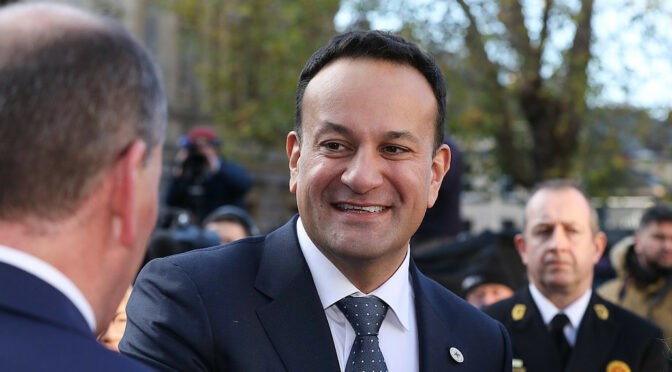
Leo Varadkar’s Ireland has washed its hands of Ukraine
Article published in The Sunday Telegraph, 7 October 2023. © Richard Kemp
Who does Mr Varadkar think he’s kidding? When he says Britain is ‘disengaging from the world, he’s talking about the Britain that has led the world in responding to the worst military crisis to hit Europe since the Second World War. Varadkar’s own country, and many other European nations, were paralysed by fear as the Russian invasion unfolded, hoping it would all just go away. Meanwhile Britain was ahead of the pack in sending arms to Kyiv and immediately played an active role in encouraging others to do the same.
Boris Johnson’s leadership helped stiffen US resolve, reminiscent of Margaret Thatcher’s exhortation to President George HW Bush when Saddam Hussein invaded Kuwait in 1990: ‘This is no time to go wobbly.’
Since then Britain has been providing weapons, military training, financial assistance, vital intelligence and taking in large numbers of refugees fleeing Putin’s aggression. We have enthusiastically sent in long range missiles and tanks, shaming others to follow suit. Hardly the actions of a nation that is retiring from the world stage.
So what has Varadkar been doing to help the war effort? In the words of President Zelensky, Ireland ‘almost stands with us’. Like the UK, Ireland has commendably taken in Ukrainian refugees, but beyond that it has only provided a handful of trainers as part of an EU mission and sent body armour, field rations and some de-mining equipment. Admittedly Ireland is a small country, but for example, it has stockpiles of modern anti-armour weaponry gathering dust, including Javelin missiles which Britain and America supplied to devastating effect against Putin’s tanks.
Ireland’s excuse for this failure to help a European neighbour in distress is supposedly that it is militarily but not politically neutral. Continue reading

Ukraine is being starved by Joe Biden’s strategic idiocy
Article published in The Daily Telegraph, 2 October 2023. © Richard Kemp
The US suspension of additional funding for Ukraine is a totemic moment in this conflict. Even if agreement is reached by Congress to extend financial assistance beyond mid-November, the political manoeuvring that saw Biden’s bid for a $24 million aid package slashed by three-quarters and then ditched altogether expose the immense difficulties the White House will have pushing future tranches through Congress.
That some Republicans were willing to shut down the US government over support for Ukraine is a very bad sign: even if they don’t win the presidency they will likely take control of the Senate next year. Their machinations were being driven by domestic political objectives in the midst of an election campaign rather than purposeful abandonment of the Ukrainian cause. But they must still be seen against the backdrop of the distinct lack of public support for continued backing of Ukraine’s war, with an opinion poll in August showing only 45 per cent of Americans ready to provide additional funding.
The mood against continuing support is significantly stronger among Republican voters who have traditionally been more bullish on foreign policy and use of force, and this shift in perspective is largely down to Donald Trump’s stance on the war. But the blame for imperilling Ukraine as Congress has falls squarely on Biden’s own shoulders. Had he not dragged his heels at every turn, refusing since the beginning to supply essential combat equipment in time or in sufficient numbers, the impact of Congressional recalcitrance would have been blunted.
His fear of antagonising Putin means that the critical long-range missiles have still not arrived, and there is no likelihood of seeing F16s in the skies anytime soon. These and other war-winning assets could easily have been sent in before popular support began to fall away and ahead of electoral politics taking centre stage. Both of these potential hazards were predictable, but rather than acting Continue reading
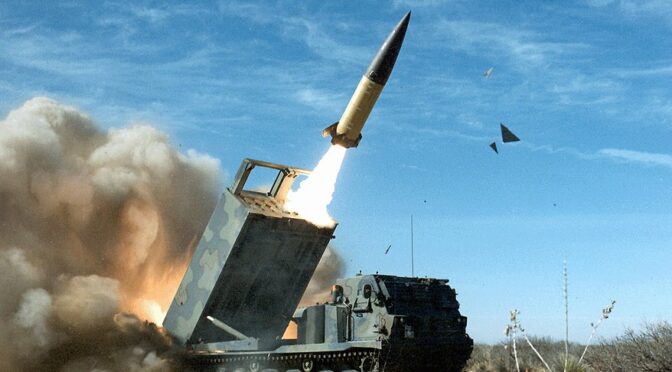
Ukraine must now take the war into Russia
Article published in The Daily Telegraph, 24 September 2023. © Richard Kemp
After more than a year of procrastination, President Joe Biden has reportedly told President Volodymyr Zelensky that ATACMS ballistic missiles will be sent to Ukraine. I experienced ATACMS fire missions against high value Iraqi targets in 1991 during Operation Desert Storm. They are powerful and precise, capable of wreaking destruction on enemy forces up to 190 miles away.
These missiles are badly needed by Ukraine, outnumbered against Russian defences with air superiority and a 10:1 advantage in artillery. But formidable as they are, they will not be a game-changer. According to reports from Washington only ‘a small number’ are to be supplied and it may be many more months before they actually come into action.
Unnecessary delays in supplying vital combat capabilities, including tanks and F16s, cost lives and handicap Kyiv’s efforts to drive the Russians out. Behind this is a fear of provoking Putin and triggering escalation. That fear is unfounded: Moscow is already throwing everything it’s got into this war and the last thing it can afford is a direct fight with Nato. Nor would Putin dare hit the nuclear button, despite his earlier bluster, now muted. Every one of his red lines crossed so far by Ukraine or the West has been met with the same bluster. True to sabre-rattling form, the day after the ATACMS decision was made public, Sergey Lavrov, the foreign minister, again trotted out the familiar line that the West is ‘directly at war’ with Russia.
Another consequence of Washington’s unfounded fear of escalation is that when ATACMS eventually arrive, they will come with a red flag banning their use against targets on Russian sovereign territory. That irrational restriction applies to all Western-supplied weapons, so while Russia is free to strike any target it can get to in Ukraine, Kyiv has one hand tied behind its back. Untying that hand could prove pivotal in this war, enabling Ukraine to strike Russian military headquarters, air bases, munitions factories, and supply lines. Continue reading
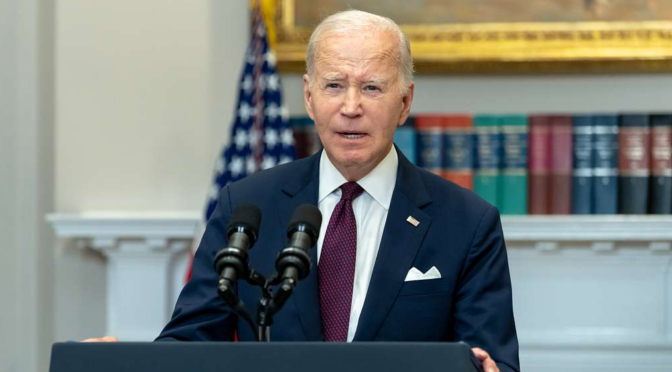
Biden needs Netanyahu for a foreign policy success
Article published by Ynetnews.com, 21 September 2023. © Richard Kemp
Finally, a full nine months into Benjamin Netanyahu’s latest government, US President Joe Biden deigned to allow him into his presence. Historically, American presidents have invited newly installed Israeli prime ministers to the White House shortly after taking office. Even this meeting on Wednesday however was not in Washington but in New York, on the sidelines of the United Nations General Assembly.
Such pointed lack of respect is not the way to treat one of America’s most valuable allies, and perhaps the staunchest of them all. It is all about petty political point-scoring and interfering in Israel’s internal democratic processes.
But despite his short-sighted rebuke to the State of Israel and its prime minister, Biden actually needs at least as much from Netanyahu as Netanyahu needs from him. With the 2024 election looming, Biden is desperate for a foreign policy success among a sea of abject failures, perhaps unprecedented in the tenure of any US president.
The catastrophic retreat from Afghanistan was symbolically worse than when the US pulled out of Vietnam. Strategically it was an even bigger disaster, signaling US and NATO weakness to friends and enemies alike, not least Russia, China, Iran and North Korea.
The Afghanistan debacle led directly to a second Biden foreign policy failure, as he pretty much flashed a green light to Putin’s invasion of Ukraine just six months later. As the saying goes: ‘Strength deters, weakness provokes.’
Since then, Biden’s ill-judged fear of Putin escalating the war has led to procrastination and heel-dragging over military aid that today sees Kyiv’s forces bogged down in an underpowered counteroffensive that is hobbled by inadequate combat hardware, while also Continue reading
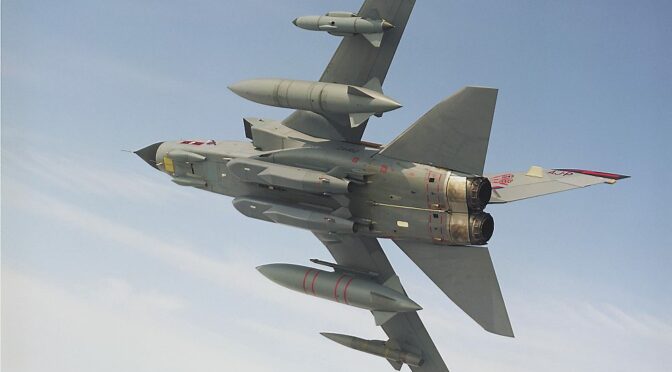
The triumph of British Storm Shadow missiles in Ukraine shames Joe Biden
Article published in The Daily Telegraph, 14 September 2023. © Richard Kemp
British-supplied Storm Shadow cruise missiles were the key element of a highly sophisticated Ukrainian air and sea attack this week that represented the most powerful strike against Crimea since the war began. The missiles hit a Kilo Class attack submarine and a large amphibious landing ship in the Russian-occupied port of Sevastopol, and likely caused significant damage to dock facilities. Disabling of the latter vessel was a particular blow for Moscow as these ships are critical for supply from Russia into Crimea following successive attacks on the Kerch Bridge.
When the UK first sent Storm Shadows to Ukraine, armchair experts derided their capabilities, suggesting they were only second best to US equivalents. That is certainly not the view in Kyiv. Most people I have met here in recent days – from senior military commanders and politicians to the man in the street – are hugely grateful for Britain’s support in their war effort. ‘Storm Shadow’ is now a familiar phrase in the Ukrainian lexicon.
Nor is it the view in Moscow, which has been targeting runways and air bases utilised by the planes that are used to launch Storm Shadow. These missiles have inflicted severe damage to Russian command posts and logistics dumps deep behind the front lines. And last month they were used to strike key bridges linking the Russian land corridor in occupied Ukraine to Crimea, disrupting supply lines.
With a range of 150 miles, Storm Shadow and its French equivalent, Scalp, are rare in being Western-supplied weapons that can reach into Crimea from behind current Ukrainian lines. This is believed to be the first strike on the peninsula itself by Storm Shadow. Along with previous attacks against Russian naval facilities on the Black Sea and on the Kerch Bridge, it has caused serious disruption to Putin’s strategy. Moscow will now have to redeploy scarce air defence assets to Crimea to protect against future attacks, increasing vulnerability in other critical areas. Continue reading
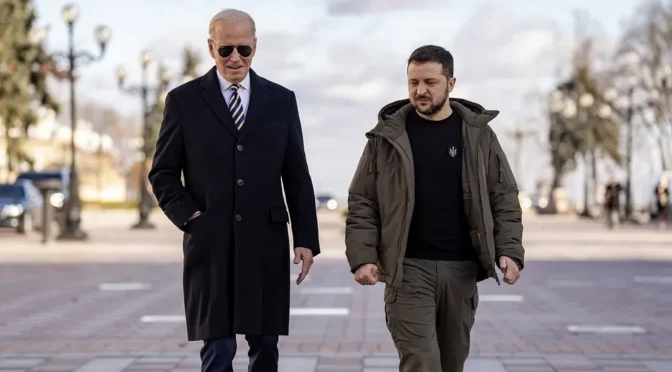
Ukraine’s counter-offensive is stalling. The West must prepare for humiliation
Article published in The Sunday Telegraph, 10 September 2023. © Richard Kemp
Time is running out for Ukraine. After 18 months of war, it is no longer a question of if the Western alliance will falter, but when. Since the start, despite making many of the right noises and supplying some military hardware, France and Germany, in particular, have been reluctant partners. Their leaders have often seemed more concerned with finding an ‘off-ramp’ for Vladimir Putin than ejecting his forces from Ukraine. As well as dependency on Russian energy, a pacifist instinct among Western European political classes has led to neglect of their armed forces and a corresponding fear of escalation.
As the provider of the lion’s share of backing for Ukraine, it is the US calling the shots in this war. Yet, since the earliest days, President Biden, too, has been dragging his heels, giving just about enough military assistance to keep Ukraine fighting, but intentionally not enough to enable a victory.
Like his Western European allies, Biden has been successfully deterred by Putin’s empty threats of widening the war. Faint-hearted concerns over provoking Putin explains his failure to provide urgently-needed weapons, including combat planes and long-range missiles, and for his obstinate resistance against Nato membership for Ukraine.
Now, polls in both Europe and the US show public support for military aid to Kyiv dropping away, with one recent survey indicating that less than 50 per cent of Americans are in favour of additional funding. This at least partially reflects sluggish progress in Ukraine’s counter-offensive, which has seen only limited gains so far.
Western military analysts and the media built expectations that, this summer, Kyiv would repeat its striking victories of last autumn at Kharkiv and Kherson. Now, people are wondering how much bang Continue reading
